The 2020 Mac Mini Unleashed: Putting Apple Silicon M1 To The Test
by Andrei Frumusanu on November 17, 2020 9:00 AM ESTBenchmarks: Whatever Is Available
As we’ve had very little time with the Mac mini, and the fact that this not only is a macOS system, but a new Arm64-based macOS system, our usual benchmark choices that we tend to use aren’t really available to us. We’ve made due with a assortment of available tests at the time of the launch to give us a rough idea of the performance:
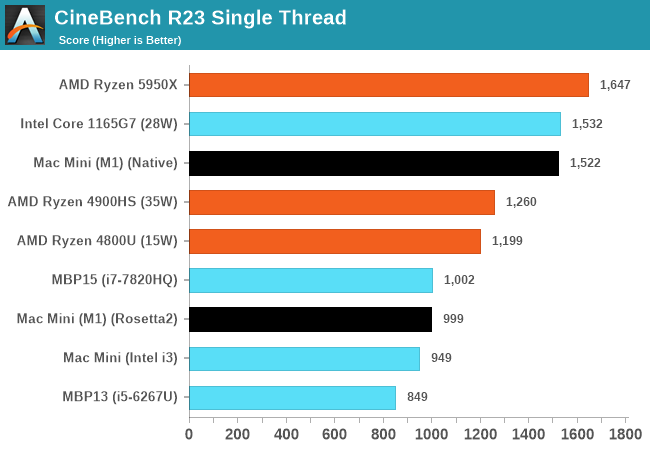
One particular benchmark that sees the first light of day on macOS as well as Apple Silicon is Cinebench. In this first-time view of the popular Cinema4D based benchmark, we see the Apple M1 toe-to-toe with the best-performing x86 CPUs on the market, vastly outperforming past Apple iterations of Intel silicon. The M1 here loses out to Zen3 and Tiger Lake CPUs, which still seem to have an advantage, although we’re not sure of the microarchitectural characteristics of the new benchmark.
What’s notable is the performance of the Rosetta2 run of the benchmark when in x86 mode, which is not only able to keep up with past Mac iterations but still also beat them.
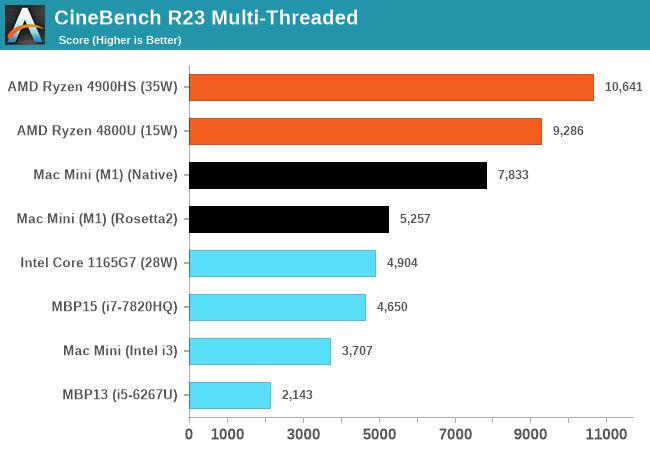
In the multi-threaded R23 runs, the M1 absolutely dominates past Macs with similar low-power CPUs. Just as of note, we’re trying to gather more data on other systems as we have access to them, and expand the graph in further updates of the article past publishing.
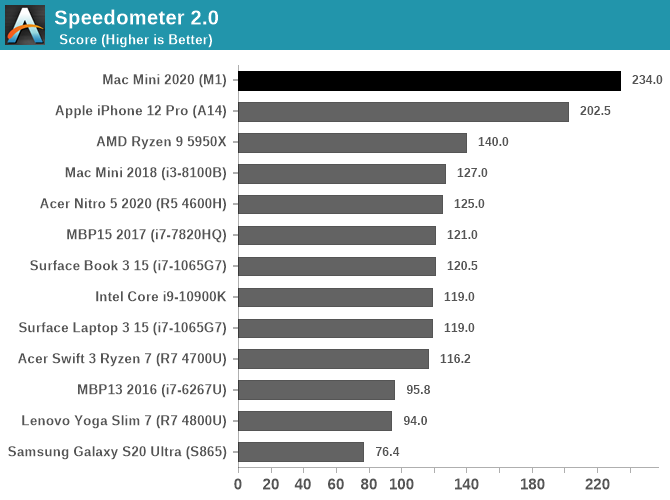
In browser-benchmarks we’ve known Apple’s CPUs to very much dominate across the landscape, but there were doubts as to whether this was due to the CPUs themselves in the iPhone or rather just the browsers and browser engines. Now running on macOS and desktop Safari, being able to compare data to other Intel Mac systems, we can come to the conclusion that the performance advantage is due to Apple’s CPU designs.
Web-browsing performance seems to be an extremely high priority for Apple’s CPU, and this makes sense as it’s the killer workload for mobile SoCs and the workload that one uses the most in everyday life.
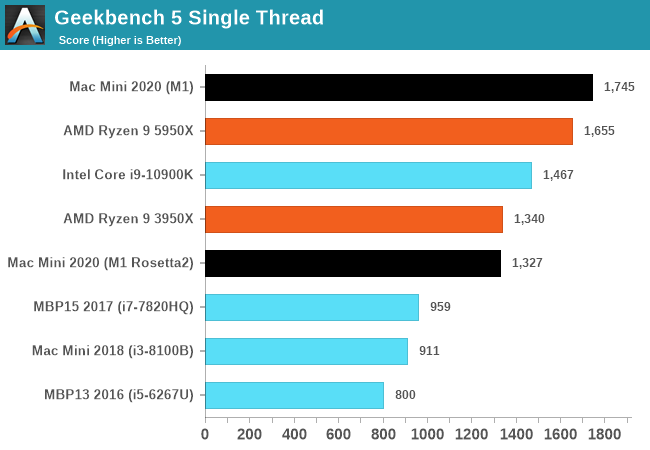
In Geekbench 5, the M1 does again extremely well as it actually takes the lead in our performance figures. Even when running in x86 compatibility mode, the M1 is able to match the top single-threaded performance of last generation’s high-end CPUs, and vastly exceed that of past iterations of the Mac mini and past Macbooks.
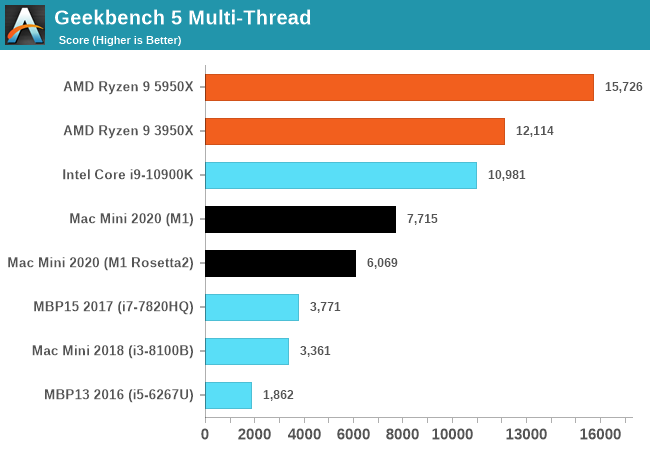
Multi-threaded performance is a matter of core-count and power efficiency of a design. The M1 here demolishes a 2017 15-inch Macbook Pro with an Intel i7-7820HQ with 4 cores and 8 threads, posting over double the score. We’ll be adding more data-points as we collect them.


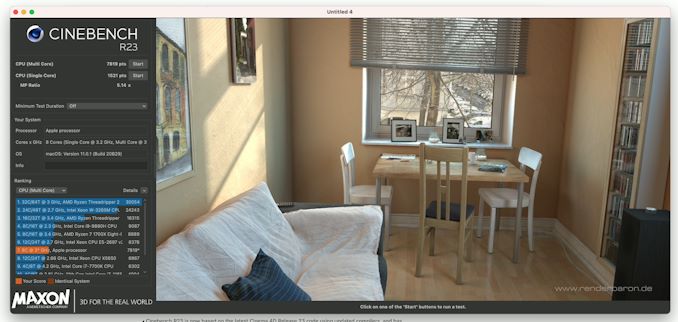








682 Comments
View All Comments
andreltrn - Tuesday, November 17, 2020 - link
Because pros won't integrate new equipment in their workflow until they know it is flawless. Wait until Spring 2021 when the next version (The M2 or m1X) comes out. Then they will stop selling intel based Macbook. Probably in 2022 they will ditch the Xeon in the MacPro as well.Spunjji - Thursday, November 19, 2020 - link
"People think this is going to destroy 5950X and 10 series i9"People are indeed capable of extrapolating daft conclusions from data, but that's not what the data says. The data says that a multicore chip based on this architecture and a comparable number of cores to an i9 or 5950X *could* be competitive in its performance, and for some reason a lot of responses are assuming that means it's *already the case with M1*.
KPOM - Tuesday, November 17, 2020 - link
Very impressive. I have a MacBook Air arriving today and can hardly wait to test it out.robco - Tuesday, November 17, 2020 - link
Only the Air has the 7 core GPU at the entry level. The MBP and Mini both have 8 core GPUs.KPOM - Tuesday, November 17, 2020 - link
I have the Air with the 8-core GPU, though it's only about 6-7% faster than the 7-core GPU. I get Metal scores about 20,500 in Geekbench, FWIW.MonkeyPaw - Tuesday, November 17, 2020 - link
"Finally, it should be noted that Apple is shipping two different GPU configurations for the M1. The MacBook Air and MacBook Pro get chips with all 8 GPU cores enabled. "Small correction here, the MBA also has a 7 core GPU option at the entry level. I guess time will tell on how much more performance that extra GPU core will get you.
KPOM - Tuesday, November 17, 2020 - link
My guess is that the “missing” GPU core won’t make much difference for the average consumer. It’s likely just Apple binning chips and using ones with a “defective” GPU in the base Airs. It’s $50 less than the 8-core models similarly equipped.Stuka87 - Tuesday, November 17, 2020 - link
I have gone through three previous Apple hardware migrations (68K-16bit --> 68K-32bit --> PPC --> Intel) so they certainly know how to make it not terrible. Will be curious how this one goes. But the performance shown here is better than I expected, which is a plus. But losing the ability to run Windows apps is a big issue for me, so I doubt I will be moving over anytime soon.YesYesNo - Tuesday, November 17, 2020 - link
The lack of windows makes it a no for my work machine and no external GPU makes it a no for my home machine.biigD - Tuesday, November 17, 2020 - link
Their products aren't for me either, but I'm happy to see them come out swinging. It'll be good for all of us in the long run.